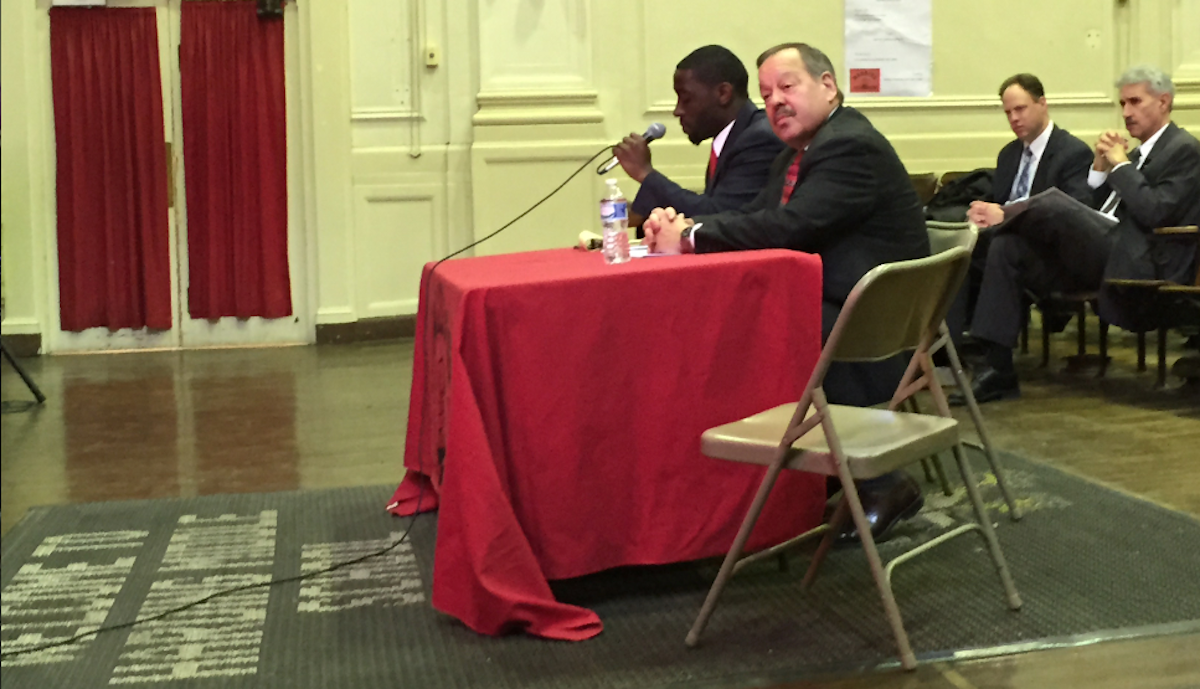Diaz pitches idea of a parent-led city school board

Nelson Diaz waits to address the House Democratic Policy Committee at Harding Middle School in Frankford. (Brian Hickey/WHYY)
Inside a Frankford middle school that resembled a construction site from the exterior, mayoral candidate Nelson Diaz said Monday that he’d like to see the state-dominated School Reform Commission replaced by a local school board consisting of parents of public-school children.
Diaz was one of several elected or aspiring officials to speak at an education-funding hearing held by House Democrats inside the auditorium at Warren G. Harding Middle School.
Others included City Council members Maria Quinones-Sanchez, Jannie Blackwell and Curtis Jones, along with at-large Council candidate Isaiah Thomas. Diaz was the last to address the committee, which held the hearing in state Rep. Jason Dawkins district.
He offered his standard stump speech about getting into the mayoral race on a mission to fix Philadelphia’s schools “or die trying,” and his wish of “ending the School Reform Commission and establishing mayoral control.”
If elected mayor, Diaz told the committee, he would seek a school board composed solely of parents with students going to a district school.
“I want this responsibility because nothing is more important to the future of Philadelphia” than fixing what ails the city’s public-school system, he said.
He reiterated the need for a fair formula to calculate state aid to schools, “only having as many [charter-school] spots as we can afford” and how he has long opposed school-voucher proposals.
“None of these ideas are rocket science,” Diaz said, “but getting them implemented is.”
State Rep. James Roebuck (D-University City/West Philadelphia) agreed with Diaz’s “scrap-the-SRC” sentiment, but questioned whether Diaz intended his proposed school board to have taxing authority.
The old appointed school boards that preceded the SRC did not, and state law normally doesn’t allow appointed bodies to levy taxes. In most of Pennsylvania’s school districts, the school board is elected and does have taxing power.
Diaz didn’t clearly answer Roebuck’s question, but afterward, campaign spokesman Barry Caro told NinetyNine Diaz’s response should be translated as: No, the board would not have the authority to impose taxes.
Diaz insisted that comprehensive school funding reform is doable.
“The potential time line of reform may be much quicker than observers assume,” Diaz said. “Pennsylvania has a unique — and seemingly previously unused — procedure in our Commonwealth Constitution for an expedited amendment to the Constitution.
“If we can build consensus around tax reform proposals supported by both the business community and progressive activists, there’s no need to wait years for it to take effect. We can raise a little more money locally immediately, and a lot more money long term, with just one vote.”
Here’s a full text copy of the “comprehensive school reform plan” that Diaz outlined before the committee (PDF).
WHYY is your source for fact-based, in-depth journalism and information. As a nonprofit organization, we rely on financial support from readers like you. Please give today.




